Waltons Guest House, Bath, Sunday evening, 13 August 2000:

 All in the golden afternoon,
All in the golden afternoon,
Full leisurely we glide . . .

 During our day in Oxford, yesterday, we followed if not in the footsteps then in the oar-splashes of Lewis Carroll and Alice Liddell, by hiring a boat at the "Head of the River" tavern by Folly Bridge and going for a row down the Thames. On the way there we visited the shop on St. Aldates (left) that appears in Through the Looking-Glass, kept by a sheep knitting with many needles. (True to the looking-glass principle, Tenniel's illustration shows the window on the left and the door on the right in a view from the inside.) Unlike our distinguished predecessors, after rowing down the Thames a few hundred yards we took a left up the Cherwell and into what seemed total wilderness in the midst of the city (complete with great clouds of insects ready to descend on us from any tree our boat brushed too roughly). Then we came past an unattended cable ferry, an improvised outdoor theatrical space where A Midsummer Night's Dream and a dramatization of Through the Looking-Glass were in production, and then the playing fields of Merton College (right), before turning round at St. Hilda's College.
During our day in Oxford, yesterday, we followed if not in the footsteps then in the oar-splashes of Lewis Carroll and Alice Liddell, by hiring a boat at the "Head of the River" tavern by Folly Bridge and going for a row down the Thames. On the way there we visited the shop on St. Aldates (left) that appears in Through the Looking-Glass, kept by a sheep knitting with many needles. (True to the looking-glass principle, Tenniel's illustration shows the window on the left and the door on the right in a view from the inside.) Unlike our distinguished predecessors, after rowing down the Thames a few hundred yards we took a left up the Cherwell and into what seemed total wilderness in the midst of the city (complete with great clouds of insects ready to descend on us from any tree our boat brushed too roughly). Then we came past an unattended cable ferry, an improvised outdoor theatrical space where A Midsummer Night's Dream and a dramatization of Through the Looking-Glass were in production, and then the playing fields of Merton College (right), before turning round at St. Hilda's College.
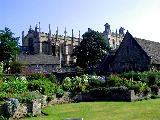
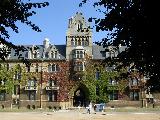
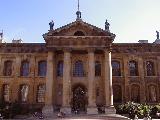 Other sights we saw on foot included Christ Church College (two photos at left) and the old Bodleian Library (right).
Other sights we saw on foot included Christ Church College (two photos at left) and the old Bodleian Library (right).
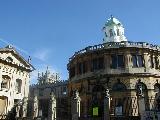
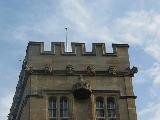 We were struck by the overtly comic carved faces surrounding the Sheldonian Theatre (left), an early home of the University Press, next to the Bodleian and opposite Blackwell's vast and marvelous bookshop; and also by those adorning the tops of University College on "the High" (right).
We were struck by the overtly comic carved faces surrounding the Sheldonian Theatre (left), an early home of the University Press, next to the Bodleian and opposite Blackwell's vast and marvelous bookshop; and also by those adorning the tops of University College on "the High" (right).
The great original university town is naturally a site of some awe for the academic. I cannot help feeling, though, that the academic spirit of inquiry, learning, and teaching, and the traditions of literary and other intellectual genius, have always rather uneasily coexisted here with the vicious old-world spirit of hereditary class, to the point where one cannot tell which has been the more zealously served and upheld by the institution. (Admittedly Plato, the original academic, is himself grotesquely classist in The Republic.) An exhibit at the Museum of Oxford showed in mock-up the college room of an eighteenth-century "Gentleman Commoner" student, the son of a baronet. The exhibit very meticulously defined his social rank in the university (second only to "Nobleman," but still not allowed to keep a servant on the premises or to dine at the dean's table), as well as itemizing his expenses. Hillaire Belloc recalls Oxford as a place "where, with decent application, / One gets a good, sound, middle-class education," but I fear there is a good deal of whistling in the dark in those deflating lines.
previous entry
next entry
main/ToC page
 During our day in Oxford, yesterday, we followed if not in the footsteps then in the oar-splashes of Lewis Carroll and Alice Liddell, by hiring a boat at the "Head of the River" tavern by Folly Bridge and going for a row down the Thames. On the way there we visited the shop on St. Aldates (left) that appears in Through the Looking-Glass, kept by a sheep knitting with many needles. (True to the looking-glass principle, Tenniel's illustration shows the window on the left and the door on the right in a view from the inside.) Unlike our distinguished predecessors, after rowing down the Thames a few hundred yards we took a left up the Cherwell and into what seemed total wilderness in the midst of the city (complete with great clouds of insects ready to descend on us from any tree our boat brushed too roughly). Then we came past an unattended cable ferry, an improvised outdoor theatrical space where A Midsummer Night's Dream and a dramatization of Through the Looking-Glass were in production, and then the playing fields of Merton College (right), before turning round at St. Hilda's College.
During our day in Oxford, yesterday, we followed if not in the footsteps then in the oar-splashes of Lewis Carroll and Alice Liddell, by hiring a boat at the "Head of the River" tavern by Folly Bridge and going for a row down the Thames. On the way there we visited the shop on St. Aldates (left) that appears in Through the Looking-Glass, kept by a sheep knitting with many needles. (True to the looking-glass principle, Tenniel's illustration shows the window on the left and the door on the right in a view from the inside.) Unlike our distinguished predecessors, after rowing down the Thames a few hundred yards we took a left up the Cherwell and into what seemed total wilderness in the midst of the city (complete with great clouds of insects ready to descend on us from any tree our boat brushed too roughly). Then we came past an unattended cable ferry, an improvised outdoor theatrical space where A Midsummer Night's Dream and a dramatization of Through the Looking-Glass were in production, and then the playing fields of Merton College (right), before turning round at St. Hilda's College.





